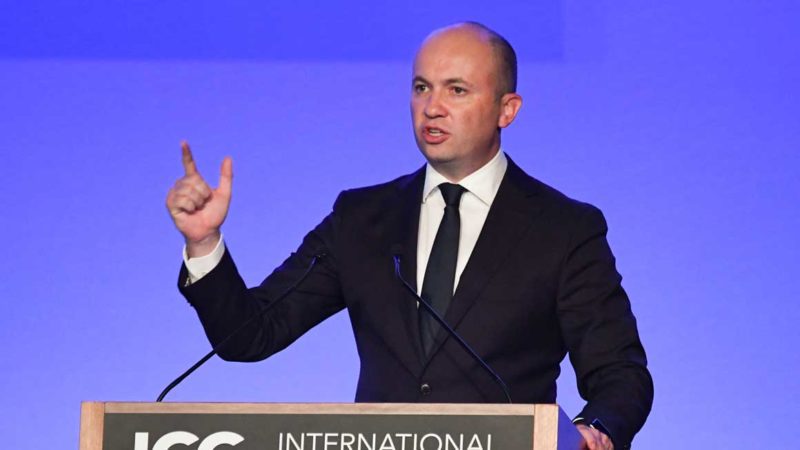A new plan to encourage NSW drivers to adopt electric vehicles will soon be released by the NSW Liberal government, according to a tweet by minister for energy and the environment Matt Kean on Thursday evening.
In response to an initial enquiry to Kean’s office a spokesperson for the minister confirmed that the plan will be announced “soon” and that it would be part of a wider energy strategy. No more details were given.
Kean responded on social media channel Twitter to a question from Ben Palmer about possible incentives that the package is “ready” and “just waiting for green light to announce”.
Stay tuned. Package ready just waiting for green light to announce
— Matt Kean MP (@Matt_KeanMP) January 16, 2020
The statement by Kean is promising, given the growing concern about Australia’s devastating bushfires, and the increased need to address the underlying cause of the “megablazes” in NSW and Victoria – climate change.
Kean also broke ranks with LNP party politics last December, declaring at the National Smart Energy Summit that to oppose the transition to renewable energy – in which electric vehicles play an important part – would be tantamount to becoming the Kodak of the clean energy era.
He has also been absolutely clear about the link between man-made climate change and the bushfires, and the need to take action.
While there are no details on the expected electric vehicle incentives from the NSW government, it is possible that it would include strategies such as reducing or eliminating stamp duty for electric vehicles such as in Queensland and the ACT.
Other examples of incentives introduced by overseas governments include federal tax rebates such as in the US, subsidies in China and bonus schemes in Europe.
Pacific neighbour and climate action leader New Zealand in July 2019 introduced a clean car “feebate” that will see New Zealanders receive a discount of up to $NZ8000 (about $A7,700) to purchase a new electric car or pay a fee up to $NZ3,000 (about $A2,900) when purchasing new high polluting vehicles.
Meanwhile, at a federal level, minister for industry, science and technology Karen Andrews has published a report on the Australian carmaking industry entitled “Australian Automotive Industry: Transition following end of Australian motor vehicle production”.
The document largely deals with the fallout and subsequent transition of the closure of Australia’s 3 major car manufacturers – Ford, Holden and Toyota in 2016 and 2017 – which resulted in some 4,000 job losses according to the report.
It also looks forward to the sales and employment outlook for remaining automotive components manufacturers.
“For future growth, electric vehicle markets offer significant opportunities for businesses to participate further in global supply chains,” said Andrews in a statement regarding the report.
“Our manufacturers also have strengths in emerging areas of light weight components, battery recharging and cooling, and autonomous vehicle technologies.”
The document itself, however, mentions electric vehicles just once, noting on page 5 that, “Going forward, the Australian Government will continue to encourage innovation, build industry capability, and assist future emerging industries such as autonomous vehicle and related technologies; hydrogen and electric vehicles and related technologies.”
The federal Coalition, which made some outlandish claims about Labor’s target of 50 per cent EV sales in the new car market by 2030, is due to release its EV strategy later this year.
The report notes two ongoing programs that will continue to assist the transition of the local automotive industry; the $100 million Advanced Manufacturing Fund’s Automotive Innovation Labs (worth $10 million) and a $5 million Automotive Engineering Graduate Program.
There is however no mention of whether the labs fund will be directed specifically towards clean transport technologies; merely to “design and test new automotive products” and undertake “automotive product development including design, prototype and development activities”.
Likewise, the graduate program is aimed vaguely at encouraging “engineering students to undertake research projects with automotive businesses”.
One would hope that innovation will guide a preference towards zero emissions transport technologies in keeping with the global shift to electromobility. But given the definitions are not specific, this cannot be guaranteed.
Neither does it mention the role that accelerating the adoption of electric vehicles – a federal policy for which is not expected to be released until mid-2020 – can play in offsetting job losses from fuel and automotive industry sectors.
As noted in the 2018 Electric Vehicle Council report entitled “Recharging the Economy“, a high adoption of electric vehicles has the potential to boost GDP by $2.9 billion and support 13,400 jobs by 2030, and has other positive economic effects including lower fuel costs and better fuel security, improved public health and growth of EV supply chains.

Bridie Schmidt is associate editor for The Driven, sister site of Renew Economy. She has been writing about electric vehicles since 2018, and has a keen interest in the role that zero-emissions transport has to play in sustainability. She has participated in podcasts such as Download This Show with Marc Fennell and Shirtloads of Science with Karl Kruszelnicki and is co-organiser of the Northern Rivers Electric Vehicle Forum. Bridie also owns a Tesla Model Y and has it available for hire on evee.com.au.

